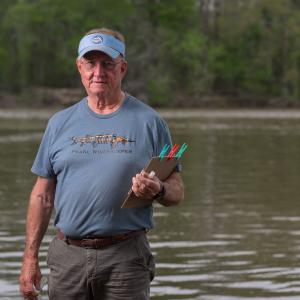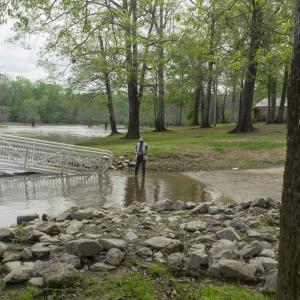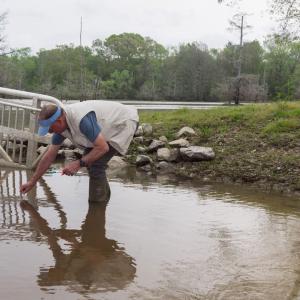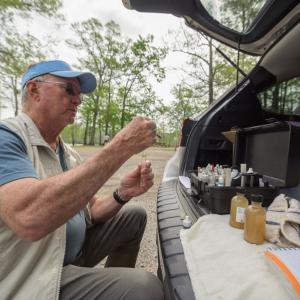Where You Are
Water Watchers
Extension trains water quality monitors
Story by Nathan Gregory • Photos by Kevin Hudson
Billy Mitchell spent his childhood summers in the water and has lived at Pelahatchie Bay for more than three decades, so his dedication to protecting water resources now almost makes too much sense.
“Growing up in South Jackson, I spent many summertime hours either swimming at the public pool across the street, or swimming and canoeing at our family’s place at a lake near Jackson,” Mitchell recalls. “My Boy Scout experience helped me learn about conservation and respect for natural resources.”
Today, he is a member of Pearl Riverkeeper (PRK), a citizen-based nonprofit founded in 2017 and dedicated to protecting the Pearl River watershed and its tributaries. Founded and directed by Abby Braman, this program is now one of several monitor groups of Mississippi Water Stewards (MSWS), a water monitoring and educational program overseen by the Mississippi State University Extension Service.
“Abby was interested in starting a water monitoring program that was both citizen-based and grounded in rigorous scientific principles,” Mitchell says. “After an extensive search, we found that Alabama Water Watch’s model was the gold standard. We reached out to them, and they graciously agreed to travel to Mississippi to train our first class of monitors in spring 2018.”
Dr. Beth Baker, MSU Extension associate professor of natural resources and agricultural ecosystems, approached Braman and the Alabama Water Watch program directors about formalizing a statewide program in Mississippi.
“The framework of MSWS as an Extension program is to provide consistent and credible education for these water monitors around the state, whether they’re individual citizens or if they’re affiliated with another organized monitoring group,” Baker explains. “From the onset, PRK has been a primary partner with Water Stewards in that they already have a good bit of citizen interest in water quality.”
Testers with PRK monitor water at selected sites along the Pearl River and its tributaries. Samples are processed in the field using MSWS procedures, and results are reported to an online data collection platform.
“Extension provides the training and materials to allow PRK and others to monitor water quality, and it provides the credibility and expertise of a trusted institution that has served Mississippi for decades,” Mitchell says.
PRK volunteers conduct monthly water chemistry and bacteria monitoring, and during the summer months, they test bacteria weekly. Chemistry monitoring reveals various levels of chemical characteristics in the water samples and indicates whether they are at acceptable levels for pH, hardness, alkalinity, dissolved oxygen, and turbidity. Bacteria monitoring tests for the presence of E. coli and determines whether there are potentially harmful levels at the test site.
Baker hopes to continue building the program in other areas of the state for residents connected to local waterways.
“I think it’s helpful for our citizens to see it as more than just a short course or a learning opportunity,” she says. “Water monitoring is a practical way to learn about water resources and understand water quality concerns and trends in your local community.
“MSWS gives you the tools and support you need to have a bigger impact than you could on your own.”








